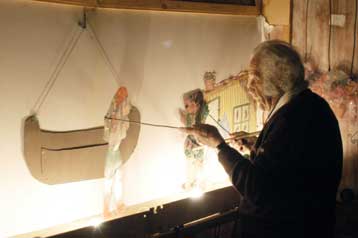Shadow Figures Theater
 Eugenios Spatharis performing
Eugenios Spatharis performingOn February 26th, the Greek Ministry of Culture decided to honor- with its remarkable tendency towards delay and eternity- Eugenios Spatharis, the most reputable animator of Shadow Figures Theater in Greece for his achievements during the last 65 years, in keeping alive the tradition of Karagkiozis. He strarted performing during the dark years of the German occupation (early '40s), while still an adolescent. There are many other shadow theater traditions around the world (in China, Indonesia, the Ottoman Empire) but Karagkiozis proved to be flexible in commenting on actual events, politics, social aspirations, phenomena of daily life, so that eventually this spectacle has not been fixed in given stories/myths. At the beginning of the school year he appears as "Karagkiozis Teaching", before the municipal elections "Karagkiozis the Mayor", before the national elections "Karagkiozis at the Parliament" and so on, along with other favorite stories that show him fighting side by side with Alexander the Great against the Cursed Snake.

I am tempted sometimes to compare these simple sketches with the way that Aristophanes criticised his contemporaries, by means of mythology and mainstream artistic reperesentations. The characters of this theater are more or less counted:
Karagkiozis- a poor Greek guy with a rebellious spirit. He is a family man, but at the same time lazy, careless, humorous, unconventional, adventurous, ready to question any social hierarchy, or be seduced by the beautiful daughter of the ruler.
Hatziavatis- a middle class Greek in the ottoman Empire: Ready to co-operate with the basha, to become spineless, to get some profit, to obey the rules of social mannerisms.
Sior Dionysios- a Greek from Zante, westernized, poetic, using italian words every now and then, strong in his feelings, helpless with reality, a friend for Karagkiozis.
Stavrakas- the typical macho street guy, he pretends to be the Lionheart, but in the end he is coward, beaten up, worthless, an exemplary liar.
Morphonios- an ugly pampered young man, spoilt by mom, delicate and an easy victim of Karagkiozis's strong hand.
The Jew- a Jew merchant of Istanbul or Thessaloniki, where Greeks and Jews were living side by side. Stingy, funny, relatively wealthy, sly on occasions, timid.
The Basha- the representative of the ruler, powerful, respectful, he never sings during the performance, keeping appearences.
Barba Yiorghos- the mountainous Greek braveheart of the south, unpolished in his behaviours, strong in fights, stubborn and proud, using a heavy accent. He is the uncle of Karagkiozis usually.
Veligkekas- the Turkish-albanian guard of the Basha. Violent, strong, stupid, using a strange dialect in which greek, turkish and albanian phrases come together.

One can easily notice the stereotypical representations; they originate from the long Ottoman experience in Greece. What is particularly interesting is that this world of another era could travel through time and become a tool for an up to date commentary and sharp criticism. Revealing perhaps continuities in human behaviour. I was so delighted while watching a series arranged by Spatharis, on Odyssey, representing Karagkiozis as one of Ulysses's sailors. Karagkiozis also became the theme of some interesting ballads of protest. He became a figure of musical and still one can buy his leather or cartboard figure in Plaka, or elsewhere. As a hero, he is positive and admirable. But the expression "Είσαι Καραγκιόζης ρε συ!!!" means "You are ridiculous, pal"
Labels: Greek Shadow Figures Theater, Karagkiozis, Popular Culture

1 Comments:
Well said.
Post a Comment
<< Home